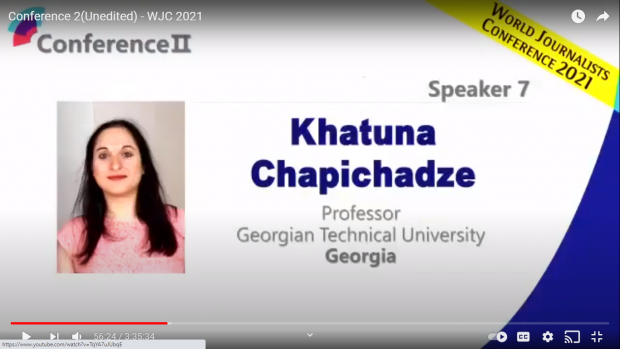
The Prospect of Post-COVID Era and the Role of Journalism: Focusing on Recovery or Applying the Special Energy Accumulated during the Quarantine Times? (Global Context)

By Khatuna Chapichadze
Georgian Technical University
San Diego State University Professor
TBILISI: The World Journalists Conference (WJC), organized by the Journalists Association of Korea (JAK) annually, was conducted from Monday, April 19 to Tuesday, April 20, 2021, online for the second time in its history – due to the continuing global pandemic – COVID-19.
Monday, April 19, the very first day of the two-day event, in which around 70 journalists and other media and non-media professionals participated from about 50 countries in total, was dedicated perhaps to the most important global challenge nowadays as is – the COVID and post-COVID era, its prospects and the role of journalism. After the Opening Address speech, made by Kim Dong Hoon, President of JAK, and Prime Minister Chung Sye-Kyun’s Congratulatory Address, 26 speakers participated in the Conference 1 through their topical presentations and Q&A Session.
After the Promotion Video of Korea, for the Debate part, I, representing the global community of the Asia Journalist Association (AJA), have prepared the following Comment, dealing with the global context of the problem from more opportunities perspective:
“It seems relatively easy to provide a very diverse list or lists of the COVID-19 impacts that it caused for the lives of humans all around the world, and in each and every sphere of a human existence starting from the health conditions and healthcare, and proceeding with the economy, social development, politics, culture, etc. and their internal, as well as external dimensions for each and every country on the planet.
However, when thinking of the post-COVID era prospects and the role of journalism in much more global context, I tend to concentrate towards two major directions: 1. Focusing on recovery – mobilizing our efforts towards overcoming the destructive impacts of the COVID-19 pandemic in every field of the human activity and life, and eventually restoring the pre-pandemic status quo, although attempting to first of all still stop and prevent to the possible extent even deeper – so far ongoing multifaceted economic, social recessions, political and cultural crises, etc., and 2. Applying the special energy accumulated during the quarantine times, which refers to the generation of more creative capacity for triggering the development of innovations, new technologies, and outstanding novel tools, techniques, and approaches in science, business, etc. This became decisively possible due to the automatically produced spare time we gained while staying constantly or predominantly home, even despite still working remotely. A lot of people lost their jobs at all as well, or their working hours and salaries have been cut by half or around.
I do not lean towards visualizing the above-mentioned scenarios as mutually exclusive ones in fact – based on quite a rich evidence illustrating the great advancements, sometimes even revolutionary, we gained and still gain in the aftermath of the COVID-19, in the post-COVID era, in the spheres of global technology, business, and science, while observing in parallel, the worldwide as well, mobilizations of diverse resources and forces aiming at primarily defeating the devastating effects of the global pandemic and re-establishing the pre-COVID conditions. I see the role of journalism and journalists substantially increasing all over the world to more extensively cover these significant developments.”
On Tuesday, April 20, during the 2nd day of the WJC 2021, in relevance to the conference session topic, I gave a speech, addressing quite critical cases in Georgia, while discussing the global climate issues and the role of journalism.


